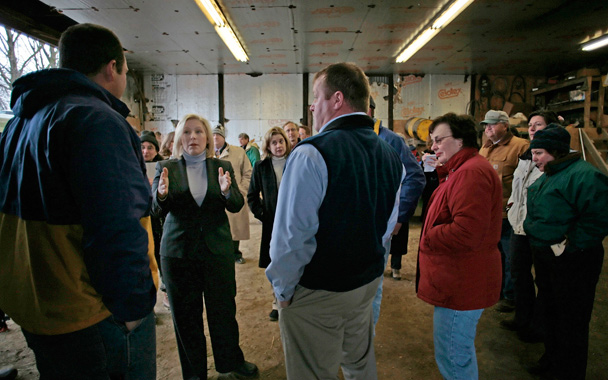Since it was first formed in 1825 as a standing committee of Congress, the Senate Committee on Agriculture has been a fortress in defense of rural-state farmers and the farm economy. This is where complex price-support formulas for cotton growers in Arkansas and soybean farmers in South Dakota find their way into federal law. Known as the Farm Bloc, these senators are perhaps the most low-key, bipartisan advocates of a single interest in Congress.
Over the years, Iowa has placed 13 different senators on the Committee, and lest anyone forget the importance of agriculture in the hawkeye state, both current senators, Tom Harkin (D) and Charles Grassley (R) sit on the Committee today. The same is true for Nebraska; both Ben Nelson (D) and Mike Johanns (R) have taken seats. Scan a Committee roster and the obvious states jump out—Kansas, Montana, Mississippi, Alabama, Minnesota, Vermont. It is hard for senators from large, urban states to make room for agriculture, though. California has the largest agriculture economy in the country, but neither Barbara Boxer nor Diane Feinstein sit on the “Ag” Committee.
In the 184-year history of the Committee, New York has seated only three members, and none since Charles Goodell, 38 years ago. The Empire State made its identity clear from the beginning: trade, finance, foreign affairs. It is hard to imagine Charles Schumer (Finance, Banking, Judiciary) or Hillary Clinton (Budget, Armed Services, Environment and Public Works) in the world of agriculture, so it came as a surprise that only days after her selection to replace Hillary Clinton as Senator from New York, Kirsten Gillibrand chose to take a position on the Committee.
Gillibrand comes from a family of hunters. Her mother is an avid gardener. One of the first bills she introduced in the New York House after being elected Representative from the Hudson Valley was a proposal to save small-scale dairies. The state’s dairy industry will remain one of her top priorities in the Senate. But these personal interests hardly command a seat on the Committee. What makes Gillibrand different is that she may see agriculture in a way traditional Farm Bloc politicians scoff at. She now represents not just upstate farmers, but one of the world’s largest, most food-savvy and economically influential urban markets.
Gillibrand’s staff suggests that she will assert herself in areas such as organic marketing, farmers markets, “buy local” networks, and even state and local efforts to keep small farms and rural landscapes from being subdivided and developed. If Gillibrand turns out to be a bridge between farmers and direct markets, her influence could be far greater than expected from a junior senator representing a state that in the past has barely paid attention to farm policy.




 Pinterest
Pinterest


